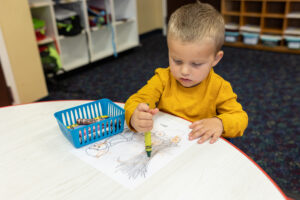 While some of the most important benefits of preschool are helping children socialize and begin to share and interact with other children and adults, socialization is also the best indicator of whether a child is ready for preschool. If a child enjoys being with other children and has the capacity to socialize and separate from Mom and Dad, the child may well be ready for preschool. There is no magical age, no magical criteria and no magical “look-fors.” Each child is unique and, therefore, his/her readiness for preschool is somewhat unique.
While some of the most important benefits of preschool are helping children socialize and begin to share and interact with other children and adults, socialization is also the best indicator of whether a child is ready for preschool. If a child enjoys being with other children and has the capacity to socialize and separate from Mom and Dad, the child may well be ready for preschool. There is no magical age, no magical criteria and no magical “look-fors.” Each child is unique and, therefore, his/her readiness for preschool is somewhat unique.
Psychoanalyst Leon Hoffman, MD, is clear that readiness is key because starting preschool too soon can be stressful for a child. “If your child feels anxious about being away from you, the benefit is not going to outweigh any acute symptoms,” says Hoffman. “If your child is uncomfortable separating from you at age two or three, you should not force the child to attend preschool.” In fact, other experts believe that any benefits of preschool will be negated by the separation anxiety.
Are there other “look-fors” to help parents determine readiness for preschool? Yes. If a three or four-year-old is not potty-trained, preschool may create more anxiety about this already anxiety-inducing and often frustrating event. When a child is the only one in diapers, he or she notices. If a child lacks expressive or receptive language, preschool may prove frustrating and stressful.
Gail Saltz, MD, an associate professor of psychiatry at the New York-Presbyterian Hospital/Weill Cornell School of Medicine in New York City writes that “Children who are uncomfortable with high levels of stimulation may also be a little put-off by preschool.” She specifically notes, “If you have an easily overwhelmed kid who is uncomfortable with music, laughing and transitioning from one thing to the next, you just might want to put them in some classes — and not have it be an all-day experience like preschool.”
When you think it’s time for your child to try preschool, do your homework! You will want to find the best atmosphere to provide the maximum benefits. Like most things, a given preschool is not one size fits all. Find the preschool that is right for your child – and right for you! How? Talk to the director, the teachers and sometimes other parents. Share any concerns or questions such as those about potty-training, language and other issues that give you pause. Take the latter with a grain of salt. Remember, what worked or didn’t work for one parent and child doesn’t need to completely dictate your decisions. Your child is unique.
Once you have decided that it is time for preschool, get your child ready!
- Build anticipation instead of anxiety. Introduce your child to the idea and to the school. Remember to keep your anxiety in check because your child will pick up on it and possibly mimic it.
- Talk about what happens in preschool – what your child will do, who they will meet, how much fun they will have. Foster a positive attitude about the experience! Again, keep your attitude in check.
- Have your child take part in getting ready. He/She can choose their backpack, clothing, snacks, etc. Activities such as these build positive anticipation and make preschool seem adventurous and something to look forward to rather than to dread.
- Help your child get ready for learning. If you haven’t, begin pointing our shapes, numbers and colors. In short, begin using learning language and building your child’s vocabulary and readiness for language learning.
- Foster self-sufficiency. Your child (and your child’s teacher) will benefit from this. Teach handwashing, how to button and zip and how to be responsible for things. When you build a sense of accomplishment, it translates to other areas.
- Teach your child the importance of listening and following instructions.
The final, yet most essential lesson, is to teach your child how to say goodbye. Anna Jane Hays, a child development expert and author says, “This is easier to do when your child understands that there will be a Hello — and when that will be. Talk about it in advance, and on the way to school, and just as you are about to make a departure.”
On that first day, say your clear, firm, rehearsed good-bye then leave. There may be tears – parents and child, but lingering only makes things worse. Adhering to your plan helps increase the likelihood that the first day (and days) will go well!
SOURCE: https://www.webmd.com/parenting/features/my-child-ready-preschool#1
